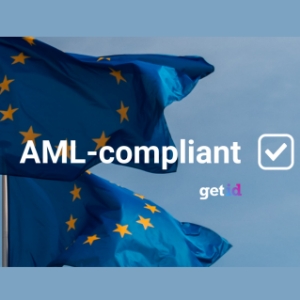Regulations Update in the EU: How Financial Sector Should Keep Up?

- Dmitri Laush, CEO at GetID
- 30.04.2021 09:45 am #financial #industry
Financial industry in Europe has to adjust to many regulations updates nowadays. The 6th EU Anti-Money Laundering Directive (AMLD6) came into force, Brexit happened. What should be aware of and how to keep up with compliance? I will take a look at it in this article.
AMLD6: what has changed
AMLD6 came into force last year. The deadline for the financial institutions for the full compliance to the requirements expires pretty soon - on 3rd of June, 2021. What are the differences from AMLD4 – AMLD5? There are several.
First of all, the new directive defined more precisely a money-laundering offense and gave 22 clear examples of those offenses in Article 2. The list includes cybercrime and tax offenses.
Secondly, criminal liability of legal entities was expanded to individuals in some positions (decision-makers at the companies). And now there is stricter punishment for those individuals that violate AML-regulations: minimum 4 years in prison (previously it was 1 year) and penalties are increased to five million euros.
AMLD6 encourages member states cooperation when it comes to money-laundering offense. All the cooperation procedures are described in the document. When crime occurs, it should be taken into consideration the country of victim’s origin, jurisdiction where the AML violation happened and etc.
Brexit: what should be aware of
The most impact Brexit will have, of course, on British companies. To have access to European market, British financial services will need to comply with AMLD6 and certain member state regulations.
On the other hand, EU based Banks and financial institutions will need to amend their trading models and the activities which they carry out with UK firms.
According to FCA, EEA-domiciled investment funds that market in the UK under a passport to continue temporarily marketing in the UK. From the 1st of January 2021, all European financial services will need to be registered with FCA and be compliant to all British AML-laws.
Changes in the regulations in particular countries and the friendliest jurisdiction
Most of European countries were just adjusting their laws to the upcoming AMLD6.
Let’s take a look at what is happening in different countries.
Germany
Last year the German Federal Government made the Draft Act for the Effective Prosecution of Money Laundering. The main goal of the draft is to implement the AMLD6 and make it easier to prosecute AML-violations. For example, according to this Act, investigative power of prosecutors will be extended significantly.
France
Also last year French government issued Ordinance No. 2020-115, which also made the local legislation keep up with AMLD6.
Cyprus
February this year the Cyprus Parliament has approved an amendment to the Prevention and Suppression of Money Laundering and Terrorist Financing Law 188 (I) 2017 (the "AML Law"). It also helps the government to keep up with new Directive on supranational level.
In my opinion, the most loyal and friendly jurisdictions for financial services in Europe are Estonia, Cyprus, Malta, Gibraltar and Switzerland. Why? Estonia has government program to support startups, Cyprus has one of the lowest rates for corporate taxation in Europe, Malta has pretty low corporate taxes as well (35%) and also have clear regulations for online gaming and gambling as well as cryptocurrencies (that services are also subject to AML). Financial services in Sweden are regulated by the Swiss Financial Services Act (“FinSA”) and the Swiss Financial Institution Act (“FinIA”). Those acts are quiet loyal. For example, client advisors of regulated financial service providers are not even required to register. That is why many financial services and crypto startups prefer to register exactly there.
Industries updates
There are several updates in different industries which are regulated by AML legislation. I’ll just give a few examples.
Payments industry
Payment Services Directive is updated and will be taken into action this year. PSD came into force in 2016, but there are some adjustments made by European Banking Authority (EBA) - PSD2, which will be out in action on 14 September 2021.
PSD2 requires banks to implement multi-factor authentication for all proximity and remote transactions performed on any channel. Authentication might include not only pin-code, but biometric recognition as well, for instance.
Gaming and gambling
KYC in gaming is really important to let children play violent games or gamble on cybersport matches.
Thus, many European countries are tightening the legislation. In Germany every gaming platform should be sure they do not let minors to register, new regulation come into action from july 2021.
In France there is a new single regulator for gaming and online gambling, l’Autorité nationale des Jeux (ANJ).
British gaming platforms should be sure minors do not use their platform and be compliant for new regulation till 2nd of September 2021.
Surely, nowadays it's time for AML-legislation tightening, so financial sector should keep up, verify clients and make sure no money laundering case has occurred with their deliberate
or non-deliberate help. Organizations need to have their compliance programs in place and take serious measures for staying compliant with regulations.
For more information visit: getid.ee



















